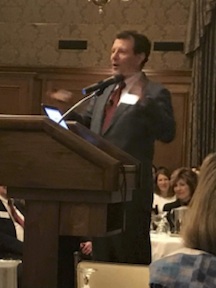By Jacob Sandstrom
Members and friends of Phi Beta Kappa recently gathered at the Union Club of Cleveland in the company of Pulitzer Prize-winning journalist Nicholas Kristof (ΦBK, Harvard College, 1981). Moderated by the City Club of Cleveland’s Dan Moulthrop, the event was an opportunity to celebrate multiple milestones, to highlight the power of education, and to reflect on the importance of the liberal arts.
Comprised of ΦBK members in the Greater Cleveland area and five member institutions—Case Western Reserve University, Hiram College, Kent State University, Oberlin College, and the College of Wooster, the Cleveland Association of Phi Beta Kappa promotes the Society through its academic, social, and community-based programs.
100 years after the Alpha of Ohio Chapter chartered at Case Western Reserve in 1847, the Cleveland Association formed in 1947 to serve as a catalyst for the lifelong pursuit of learning. 70 years later, the Association remains true to its purpose. By providing recognition for area students and endowing an annual four-year college scholarship competition, the Association supplies its members with the opportunity to cultivate a community love of learning through programs and events such as Kristof’s talk.
The evening covered Kristof’s career as a New York Times columnist, chronicled his travels to myriad countries, and most notably, underscored the need for principled efforts to bolster education with a discussion of A Path Appears, the bestseller co-authored with his wife, Sheryl WuDunn, a stand out journalist and advocate in her own right. The weighty theme of Kristof’s talk was that education is the lynchpin in the world pursuit of peace, particularly the education of young girls.
“Education is such an important toolkit” noted Kristof. From his travels, he asserts that an educated girl is often the “greatest threat […] to entrenched dictators” because of the practical, analytic skills an education affords. In many countries, dictators resort to kidnapping, abusing, and even throwing acid on women to thwart schooling, an unsettling indication of the power of education. Increasing access is utterly essential, but the challenge is in finding the proper channels for effective action.
One massive problem for effectively making change is cognitive bias; namely, the “empathy gap.” When an organization or government intervenes in a region or on a particular issue, their perspective tends to determine the outcome more than the needs of the people the efforts are supposed to help. Though being “insulated from need” can inhibit one’s ability to make a difference, there is room for hope. Truly becoming conscientious global citizens is what makes the difference; using evidence, creativity, and problem-solving skills, it is possible to make worthwhile change.
In an exclusive interview with Association Trustee Annie Morino, Kristof reflected on the importance of Phi Beta Kappa’s values in his career. “The liberal arts are essentially about asking questions, and what does a journalist do? We ask questions!” remarked Kristof. “We question narratives and we try to ferret out truth in the same way that [you would use] if you were writing a term paper about Homer or were trying to find parallels between Atatürk in Turkey and Nasser in Egypt, or whatever it may be.”
Beyond shaping his career, Kristof recognizes that the liberal arts play a key role in leading a meaningful, successful life. “[The] skill set of trying to find patterns, trying to find the truth, trying to peel away layers, trying to figure out the best questions to ask—that’s not a skill set for college. That’s a skill set for life.”
Nicholas Kristof’s talk was certainly fitting for the occasion. Learning to solve problems by using a comprehensive “analytic toolkit” is precisely what the Cleveland Association of Phi Beta Kappa and its members have done for the past 70 years. By prioritizing the liberal arts and civic engagement, the Association continues to make a marked difference in Northeast Ohio.
“The Cleveland Association of Phi Beta Kappa is very grateful to our 70th Anniversary event co-chairs, Jeanette Grasselli Brown and Joan Katz Napoli, for all of their hard work, as well as our sponsors, KeyBank and the KeyBank CEO Beth Mooney, Glenn Brown and Jeanette Grasselli Brown, Susan A. Coyne, Nana Landgraf, Samuel H. & Maria Miller Foundation, J.M. Smucker Company, and United Way of Greater Cleveland,” said Cleveland Association President Deborah A. Wilcox.
Jacob Sandstrom is a junior at Case Western Reserve University majoring in Political Science. Case Western Reserve University is home to the Alpha of Ohio Chapter of Phi Beta Kappa.
Additional photographs of the 70th Anniversary Gala and Evening with Nicholas Kristof are available on the Cleveland Association of Phi Beta Kappa’s Facebook page.
This is the second article in a two-part series on Phi Beta Kappa in Northeast Ohio. The first article, on the Alpha of Ohio Chapter’s 170 years of scholastic and civic excellence, is available here.
Photographs Courtesy of the Cleveland Association of Phi Beta Kappa
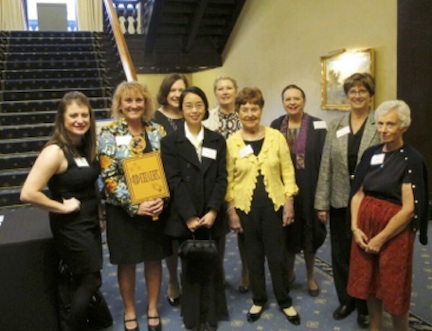
L-R: Annie Morino, Deborah Wilcox (Board President), Joan Katz Napoli (Event Co-Chair), Grace Wen, Stacey McKinley, Jeanette Grasselli Brown (Event Co-Chair), Judith Cetina, Patricia Harris, and Kathy Wendling
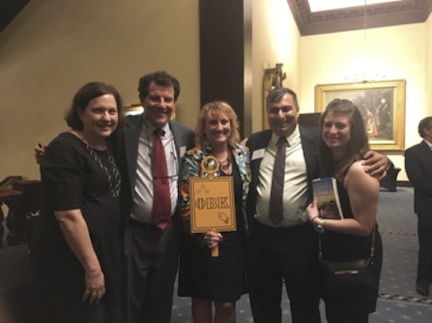
L-R: Joan Katz Napoli (Event Co-Chair), Nicholas Kristof, Deborah Wilcox (Board President), Sanjiv Kapur, and Annie Morino.
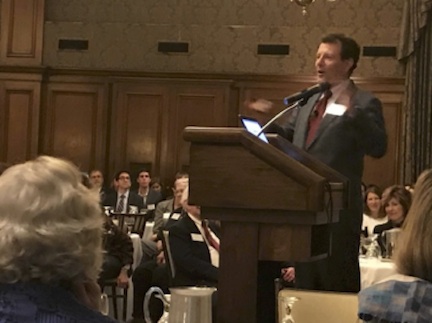
Nicholas Kristof speaks to the Cleveland Association of ΦBK.
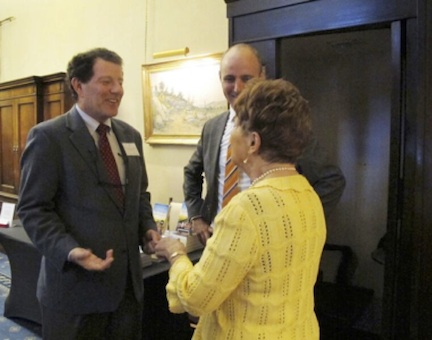
Nicholas Kristof (left) visits with Dan Moulthrop (Moderator) and Jeanette Grasselli Brown (Event Co-Chair).
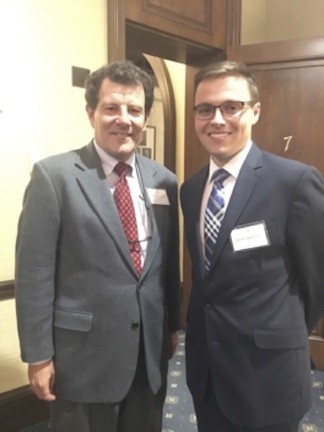
Nicholas Kristof (left) with Jacob Sandstrom (ΦBK Writing Intern).




